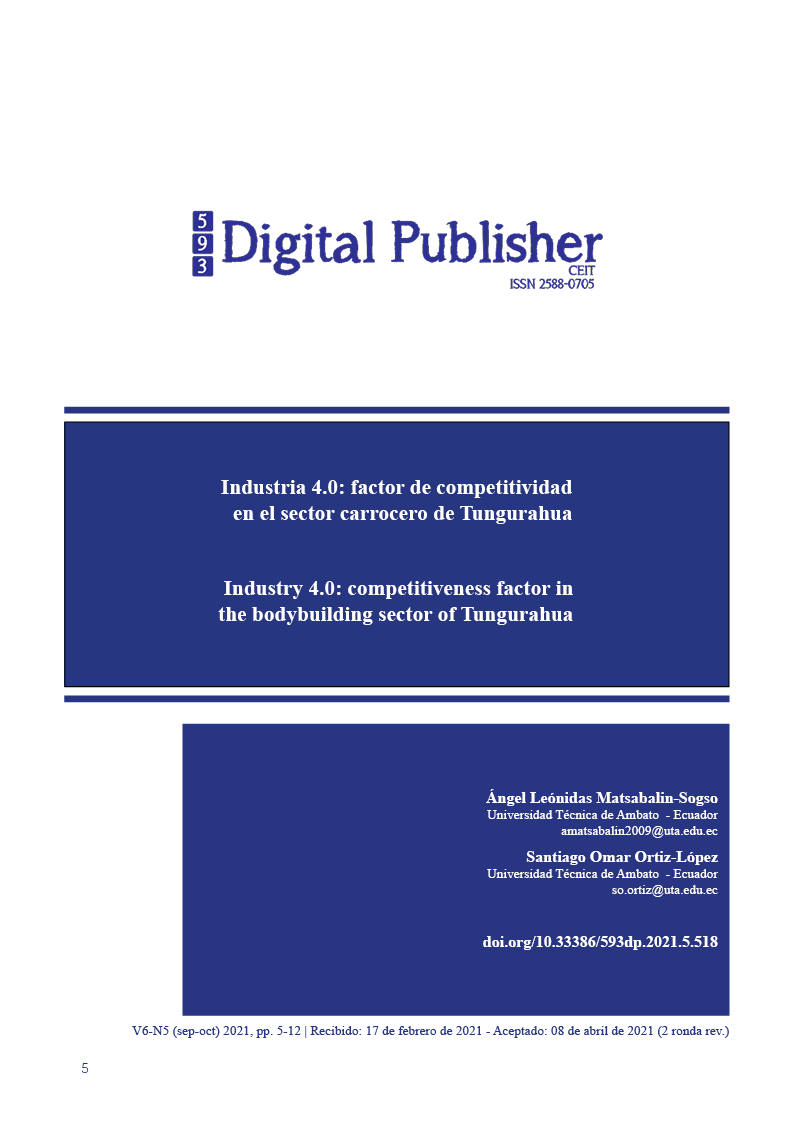Industry 4.0: competitiveness factor in the bodybuilding sector of Tungurahua
Main Article Content
Abstract
The objective of this research is to explore the environment of industry 4.0 and how they can contribute to transforming companies in the bodybuilding sector, as the importance of the use of technology in the bodywork industry is known is of great help since in the midst of globalization Not having the use of disruptive technologies to carry out interconnected processes based on the internet, Big Data, and mobile computing throughout the world can generate inadequate information handling in bodywork companies.
It has been shown that the bodybuilding sector of the Province of Tungurahua greatly helps the productive matrix of both the province and the country, so managers constantly seek to innovate in the processes, all based on reducing costs and time all this is accomplished with machinery and smart manufacturing. Some of these technologies have been handled for years, but with a low profile, however, currently it seeks to create an impact on the technological transformation, affecting various aspects that go from production to inventory control to more than control and support of the customers.
Industry 4.0 seeks the automation and integration of all the processes that are carried out in an organization, for the same reason this industry is obtaining positive results so that in the end all companies will aspire to acquire this type of intelligent technology to increase their level of competitiveness and survival against local competition. It is worth mentioning that in the province of Tungurahua 27 of the 89 companies operate throughout the country, it also represents 13.57% of GDP in the manufacturing sector with USD 13,987,057 at the same time this sector is a great generator of employment at the level national, offering stable employment to 1,348 employees, 137 occasional operators and in addition to 53 employees with some disability based on the Labor Code Law (SRI, 2017). The investigation will present an uncertain scenario where it will be verified if the Tungurahua bodybuilding companies have disruptive technologies to be able to have a high level of competitiveness.
The methodology that was used was based on the quantitative approach since data and information were examined, which were processed through statistics. In addition to a non-experimental investigation that was based on concepts and variables that occurred without the direct intervention of the researcher, that is, in a natural way and then analysis was carried out based on the information obtained.
Downloads
Article Details

This work is licensed under a Creative Commons Attribution-NonCommercial-ShareAlike 4.0 International License.
1. Derechos de autor
Las obras que se publican en 593 Digital Publisher CEIT están sujetas a los siguientes términos:
1.1. 593 Digital Publisher CEIT, conserva los derechos patrimoniales (copyright) de las obras publicadas, favorece y permite la reutilización de las mismas bajo la licencia Licencia Creative Commons 4.0 de Reconocimiento-NoComercial-CompartirIgual 4.0, por lo cual se pueden copiar, usar, difundir, transmitir y exponer públicamente, siempre que:
1.1.a. Se cite la autoría y fuente original de su publicación (revista, editorial, URL).
1.1.b. No se usen para fines comerciales u onerosos.
1.1.c. Se mencione la existencia y especificaciones de esta licencia de uso.
References
Alvarez, Y., Leguizamón, M., & Londoño, T. (4 de Septiembre de 2020). Riesgos y soluciones de seguridad existentes en el Internet de las cosas (IoT) en relación con Big Data. Revista Ingeniería y Competitividad,23(1), 1-13. doi:10.25100/iyc.23i1.9484
Basco, I., Beliz, G., Coatz, D., & Garnero, P. (2018). Industria 4.0: Fabricando el Futuro. Buenos Aires: BID Editorial.
Belman, C., Jiménez, J., & Hernández, S. (2020). Análisis exhaustivo de los principios de diseño en el contexto de Industria 4.0. Revista Iberoamericana de Automática e Informática Industrial 17 (2020) 432-447, 1-16. doi:https://doi.org/10.4995/riai.2020.12579
Buisán, M., & Valdés, F. (31 de Octubre de 2017). La industria conectada 4.0. Revista ICE Información Comercial Española, 1-12. doi:https://doi.org/10.32796/ice.2017.898
Coria, A., Galicia, E., & Ortega, I. (30 de Marzo de 2020). Productores rurales en México, capacidades de MKT e Innovación ante la industria 4.0: Nuevas formas de crear ventajas competitivas. Red Internacional de Investigadores en Competitividad, 1-21. doi:4.0978-607-96203-0-8
Garrell, A., & Guilera, L. (2019). La Industria 4.0 en la sociedad digital. Barcelona: Marge Books.
Kusiak, A. (6 de Abril de 2017). Smart manufacturing must embrace Big Data. Mac mil an Publishers Limited, 1-3. Obtenido de https://www.nature.com/news/polopoly_fs/1.21760!/menu/main/topColumns/topLeftColumn/pdf/544023a.pdf
Naya, S. (2018). Nuevo paradigma de Big Data en la era de la Industria 4.0. TOG (A Coruña) [Revista en Internet], 1-6.
País, E. (30 de Junio de 2017). Las fábricas de coches invierten en ' Big Data' para ahorrar en mantenimiento. Obtenido de https://cincodias.elpais.com/cincodias/2017/06/29/companias/1498756158_433294.html
SRI. (2017). SRI - Servicio de Rentas Interna. Obtenido de http://www.canfacecuador.com/Informe-FinalDiagnostico-Sector-Carrocero.pdf
Tuapanta, J., Duque, M., & Mena, Á. (2017). Alafa de cronbach para validar un cuestionario de uso de TIC en docentes universitarios. Revista mktDescubre - ESPOCH FADE, 1-12.
Witkowski, K. (2017). Internet of Things, Big Data, Industry 4.0 – Innovative Solutions in Logistics and Supply Chains Management. Revista Science Direct, 1-7. doi:10.1016/j.proeng.2017.03.197



